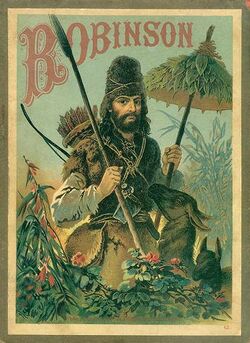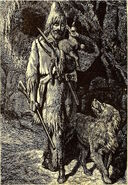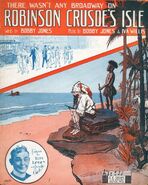Origin[]
Robinson Crusoe is a novel by Daniel Defoe, first published on 25 April 1719. This first edition credited the work's fictional protagonist Robinson Crusoe as its author, leading many readers to believe he was a real person and the book a travelogue of true incidents, and was published under the considerably longer original title The Life and Strange Surprizing Adventures of Robinson Crusoe, Of York, Mariner: Who lived Eight and Twenty Years, all alone in an un-inhabited Island on the Coast of America, near the Mouth of the Great River of Oroonoque; Having been cast on Shore by Shipwreck, wherein all the Men perished but himself. With An Account how he was at last as strangely deliver'd by Pyrates. Epistolary, confessional, and didactic in form, the book is a fictional autobiography of the title character (whose birth name is Robinson Kreutznaer)—a castaway who spends years on a remote tropical island near Trinidad, encountering cannibals, captives, and mutineers before being rescued. The story is widely perceived to have been influenced by the life of Alexander Selkirk, a Scottish castaway who lived for four years on the Pacific island called "Más a Tierra" (in 1966 its name was changed to Robinson Crusoe Island), Chile. However, other possible sources have been put forward for the text. It is possible, for example, that Defoe was inspired by the Latin or English translations of Ibn Tufail's Hayy ibn Yaqdhan, an earlier novel also set on a desert island. Another source for Defoe's novel may have been Robert Knox's account of his abduction by the King of Ceylon in 1659 in "An Historical Account of the Island Ceylon," Glasgow: James MacLehose and Sons (Publishers to the University), 1911. In his 2003 Book "In Search of Robinson Crusoe", Tim Severin contends that the account of Henry Pitman in a short book chronicling his escape from a Caribbean penal colony and subsequent shipwrecking and desert island misadventures, is the inspiration for the story. Despite its simple narrative style, Robinson Crusoe was well received in the literary world and is often credited as marking the beginning of realistic fiction as a literary genre. Before the end of 1719 the book had already run through four editions, and it has gone on to become one of the most widely published books in history, spawning numerous sequels and adaptations for stage, film, and television.
Public Domain Literary Appearances[]
- The Life and Strange Surprizing Adventures of Robinson Crusoe, Of York, Mariner: Who lived Eight and Twenty Years, all alone in an un-inhabited Island on the Coast of America, near the Mouth of the Great River of Oroonoque; Having been cast on Shore by Shipwreck, wherein all the Men perished but himself. With An Account how he was at last as strangely deliver'd by Pyrates.
- The Farther Adventures of Robinson Crusoe, by Daniel Defoe, 1719.
- Serious Reflections During the Life & Surprising Adventures of Robinson Crusoe, with His Vision of the Angelic World, by Daniel Defoe, 1720.
- Robinson Crusoe (pantomime), 1796.
- Robinson Crusoe (play), 1815.
- Robinson Crusoé (operetta), by Jacques Offenbach, libretto by Eugène Cormon and Hector‐Jonathan Crémieux, 1867.
- The Moonstone (detective novel), by Wilkie Collins, 1868. According to Wikipedia, “one of the chief characters and narrators, Gabriel Betteredge, has faith in all that Robinson Crusoe says and uses the book for a sort of divination. He considers The Adventures of Robinson Crusoe the finest book ever written, reads it over and over again, and considers a man but poorly read if he had happened not to read the book.”
- “There Wasn’t Any Broadway on Robinson Crusoe’s Isle” (song), words by Bobby Jones, music by Bobby Jones and Iva Willis, 1913.
Public Domain Appearances[]
- Kit Eternity #4
Public Domain Film Appearances[]
- Robinson Crusoe (Les aventures de Robinson Crusoë), written and directed by Georges Méliès, 1902.
- Robinson Crusoe, written and directed by M. A. Wetherell (1883–1939), Epic Films, 1927. In the public domain in the source country, the United Kingdom.
Robinson Crusoe, Jr.[]
So popular was Defoe’s novel that the whole genre of shipwreck‐survival fiction (“Robinsonade”) is named after his character, and the names of other creators’ characters, like the Swiss Family Robinson, refer to Crusoe as well. There are three public‐domain works entitled Robinson Crusoe, Jr.:
- Robinson Crusoe, Jr.: A Story for Little Folks, by Oliver Optic (pseudonym of William Taylor Adams), 1862. In imitation of his hero, eleven‐year‐old Robert Gray takes on the name Robinson Crusoe, Jr., and sets off with his pets on a homemade raft to live in isolation on a local island. Things don’t go exactly as planned. (Internet Archive)
- Robinson Crusoe, Jr. (musical), by Edgar Smith, music (of most songs) by Sigmund Romberg and James F. Hanley, words (of most songs) by Harold R. Atteridge, 1914. Millionaire Hiram Westbury travels with his chauffeur Gus Jackson to Crusoe’s island where they encounter a pirate ship, a haunted forest and many musical numbers, including the song “Where Did Robinson Crusoe Go with Friday on Saturday Night?” (words by Sam M. Lewis and Joe Young, music by George W. Meyer). (Johns Hopkins U.)
- Robinson Crusoe, Jr. (animated cartoon), by Melvin Millar, dir. Norman McCabe, prod. Leon Schlesinger, 1941. The cartoon itself has fallen into the public domain, but the Porky Pig character and some of the songs used are not. The other characters should be fine for reuse, including the version of Friday based on Eddie “Rochester” Anderson.
Gallery[]
See Also[]
- Wikipedia (Robinson Crusoe)
- Comic Vine


